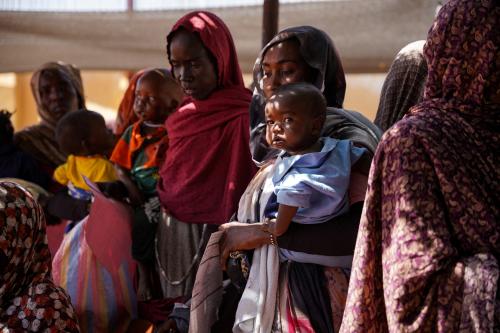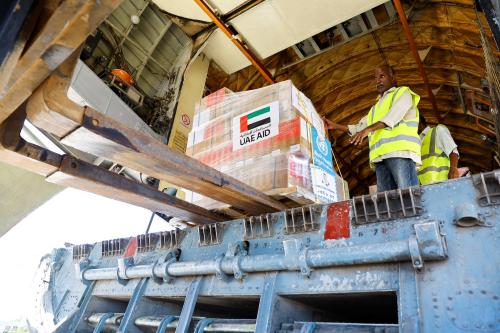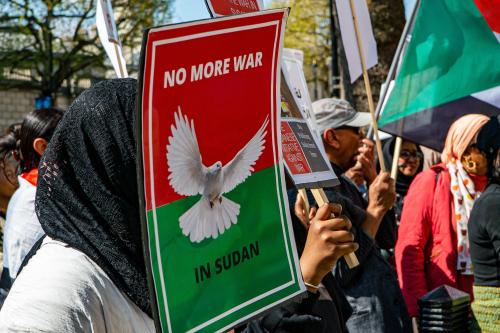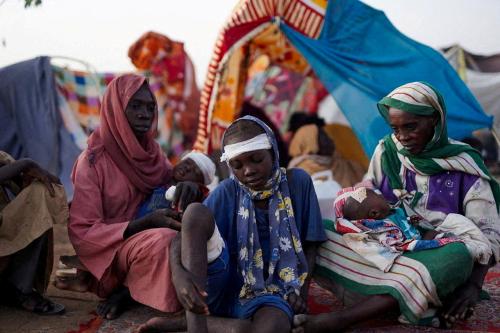Bloodstains and bodies visible from space. Video selfies of giddy fighters butchering civilians. Executions, sexual violence, torture. The October 26 fall of el-Fasher in North Darfur to Sudan’s paramilitary Rapid Support Forces (RSF) challenges Washington’s attempts to create consensus with Cairo, Riyadh, and Abu Dhabi on ending Sudan’s agony. Will Sudan feature prominently and seriously—enough to make a difference—when President Donald Trump hosts Saudi Crown Prince Mohammed bin Salman on November 18?
By that meeting, thousands in el-Fasher who survived the RSF’s 500-day siege will have been massacred. The savagery, reportedly ethnically based, fits a pattern. It highlights the RSF’s roots in the notorious Janjaweed militias accused of genocide in Darfur two decades ago. Issued just weeks before el-Fasher’s fall, the International Criminal Court’s indictment of Ali Muhammad Ali Abd-Al-Rahman (“Ali Kushayb”) for war crimes and crimes against humanity in 2003 and 2004—the ICC’s first indictment from that Darfur conflict—was too weak a symbol and issued too late to moderate the current RSF quest for carnage.
Almost unnoticed in media reports on Sudan, authorities in Port Sudan, on the other side of Sudan’s civil war, ordered the expulsion of two senior World Food Program (WFP) officials just two days after the RSF overran el-Fasher. This, too, reflects a pattern: that the Sudanese Armed Forces (SAF) deliberately obstructs life-saving humanitarian assistance. Since the SAF-RSF fratricide began in April 2023, the SAF has denied access on claims of sovereignty, tried to obstruct famine research, expelled aid workers, and refused visas for humanitarian workers. The SAF’s WFP expulsions remind humanitarian workers in Port Sudan to tread carefully or risk losing what access they have to reach starving and trapped civilians.
The SAF’s Humanitarian Aid Commission (HAC), dubbed a “hidden wall,” creates bureaucratic run-arounds to hinder aid delivery. In some areas, the HAC has attempted to control the Emergency Relief Rooms (ERRs), a grassroots network that supplies essential services, including soup kitchens. In others, shadowy cells linked to SAF intelligence services and SAF-aligned Islamist militias have menaced, detained, and killed ERR activists, who are often the only source of food and medicine to their communities. (A Norwegian human rights group recently recognized the ERRs’ heroism with its 2025 Rafto Prize, a rare bit of current, positive news about Sudan.)
Relying on brutality rather than bureaucracy, the RSF also weaponizes humanitarian access, as the berm built during its siege of el-Fasher illustrates. The RSF has looted humanitarian supplies and murdered local aid workers. Immediately after the fall of el-Fasher, RSF fighters killed or abducted 460 health workers, patients, and others in el-Fasher’s last functioning hospital. Even after winning control of the city, the RSF continues to block all humanitarian assistance to its remaining residents.
Two armies; one contempt for civilians
While their methods may vary—the SAF launches airstrikes on civilian marketplaces and has been sanctioned for the use of chemical weapons, while the RSF massacres non-Arabs in Darfur—both forces demonstrate disdain for international humanitarian law and contempt for Sudan’s citizens. Both rely on outsiders, with fingers pointing at the United Arab Emirates for arming the RSF (a claim the UAE denies), with Egypt, Qatar, Turkey, Saudi Arabia, and Iran behind the SAF. The RSF revels in its brutality, while SAF authorities in Port Sudan posture as a government (and preposterously retain Sudan’s seat at the United Nations, a simulacrum of sovereignty that Syria’s deposed dictator Bashar al-Assad also enjoyed while butchering his people).
Meanwhile, Sudan endures the world’s largest humanitarian and displacement crisis, with two declared famines (in el-Fasher and Kadugli in South Kordofan), 20 additional areas across Darfur and Kordofan at risk of famine, and millions more in crisis and emergency food insecurity. Despite the Geneva Conventions and U.N. Security Council Resolution 2417 (2018) outlawing the use of food as a weapon of war, the SAF (mimicking Assad’s starvation policies) cites sovereignty in periodically denying permission to deliver humanitarian assistance to Darfur via Chad. Concerned that the SAF could eject U.N. personnel from Port Sudan, U.N. officials have unhappily complied with SAF denials, despite the SAF’s lack of physical control of the crossing points with Chad.1
In September, the SAF pushed back an RSF offensive on el-Obeid, the capital of North Kordofan, bordering Darfur. Logistically, el-Obeid’s airport would be a sensible hub to deliver emergency supplies to el-Fasher, should pressure from the UAE or others on the RSF end its obstructions. But facilitating that would be contrary to the SAF’s usual approach of denying aid to RSF-held areas. Residents of el-Fasher who survived the RSF siege and slaughter could now face a combination of RSF and SAF-facilitated starvation.
Washington’s “outside-in” gamble
To the Trump administration’s credit, the United States is attempting an “outside-in” end to Sudan’s agony. Washington created a “Quad” initiative to get Egypt, Saudi Arabia, and the UAE aligned behind shared goals, including a humanitarian truce, that they could, then, in theory, impose on the parties that are reliant on their support. On the other hand, the Trump administration’s strangling of U.S. foreign assistance may hasten as many Sudanese deaths as the RSF is currently inflicting on el-Fasher. Last year, the United States funded nearly half of all humanitarian assistance to Sudan. As of October, the U.N.’s $4.2 billion 2025 humanitarian appeal for Sudan was only 27% funded, with only a trickle coming from Washington.
Sudan’s civilians—whether suffering under the RSF’s reign of terror while praying not to fall victim to SAF airstrikes, fighting for survival under SAF control while fleeing RSF drones, or fleeing to neighboring countries with their own humanitarian needs—have since the war’s outbreak received insufficient attention and relief from the international community. Perhaps the inconceivable cruelty and atrocities witnessed from el-Fasher will provide momentum to Washington’s Quad diplomacy (and revive U.S. humanitarian funding). Perhaps the horrors will ignite a global campaign for Sudan, mirroring the high-profile, active coalition that came together two decades ago to stop the carnage in Darfur then. That would be history worth repeating—and, this time, applying it to all of Sudan. RSF and SAF leadership, and their external supporters, need to feel consequences for enabling genocide and war crimes.
Partition without peace
If the fall of el-Fasher triggers a de facto partition of Sudan, with parallel authorities (one recognized by the U.N., both unconcerned with the welfare of Sudanese under each side’s respective control), the result could make a Libya-like scenario preferable. Despite that Libya remains divided and unstable, the U.N.-brokered ceasefire of October 23, 2020, has largely held, with only sporadic violence and far fewer casualties than Sudan faces today. Libya’s rapacious and self-serving politicians, east and west, are certainly not models of good governance. But they do not massacre and starve civilians by the score. Sudanese live under catastrophically worse conditions.
Unfortunately, General Abdel-Fattah Burhan, the SAF chief and putative head of the (almost fictional) state, and Mohammed Hamdan Dagalo (known as Hemedti), the head of the RSF, scorned the 2022-2023 tripartite efforts by the U.N., African Union, and Intergovernmental Authority on Development (the subregional body for the Horn of Africa) to restore Sudan’s civilian transition, turning their forces on each other instead. Burhan and his Islamist backers then booted out the U.N.’s political and peacemaking mission. In its place, the U.N. secretary-general’s personal envoy, the respected Algerian diplomat and former African Union peace and security commissioner Ramtane Lamamra, lacks the staff, budget, and mandate to replace the shuttered mission.
The Americans have well-intentioned ceasefire goals that the Sudanese desperately need to succeed. But an equivalent to the on-the-ground presence that the U.N. used so effectively in achieving the 2020 Libyan ceasefire is not available to Washington: the shuttling between western and eastern Libya that the U.N. employed would, in Sudan, be blocked by Burhan. As witnessed on the humanitarian file, a political presence in Port Sudan, under the pressure of the SAF and Islamists, can inhibit impartiality and action. Nor does the Trump administration appear to have the patience to sweat the details that U.N. envoys in Libya mastered. But like the United States regarding Sudan, the U.N. in Libya pursued an “outside-in” approach, keeping in close contact with external actors with influence on, and interests in, Libya, while also building consensus among Libya’s military and security actors from all sides.
Sudan’s road ahead
Given the role of outsiders in enabling the RSF and the SAF, Washington’s Quad initiative makes sense. Yet for the U.S. ceasefire efforts to succeed, Sudan must shift higher on Washington’s already crowded agendas with Abu Dhabi, Cairo, and Riyadh. Washington’s Quad partners need to grasp that the Trump administration and the president himself seriously expect them to exercise their leverage to end this war. With Burhan and Dagalo already sanctioned, a hint of possible secondary sanctions would be an unmistakable indication of seriousness. We may soon have evidence as to whether el-Fasher’s unfolding tragedy has invigorated the Americans’ efforts with the Quad: it will be revealing whether and where Sudan will appear on the agenda of the Saudi crown prince’s November 18 meeting at the White House.
-
Footnotes
- The tensions between claims of sovereign rights and humanitarian imperatives mirror the situation in Syria in 2015, when the United States successfully pushed for Security Council authorization for cross-border humanitarian deliveries, over Damascus’ objections, from Turkey to opposition-held territories. This established an unfortunate precedent that only the Security Council can transcend sovereign denial of access, assigning international humanitarian law to a lower rung than sovereignty on the legitimacy ladder.
The Brookings Institution is committed to quality, independence, and impact.
We are supported by a diverse array of funders. In line with our values and policies, each Brookings publication represents the sole views of its author(s).







Commentary
Sudan’s deadly divide: The RSF and SAF’s reign of terror
November 12, 2025